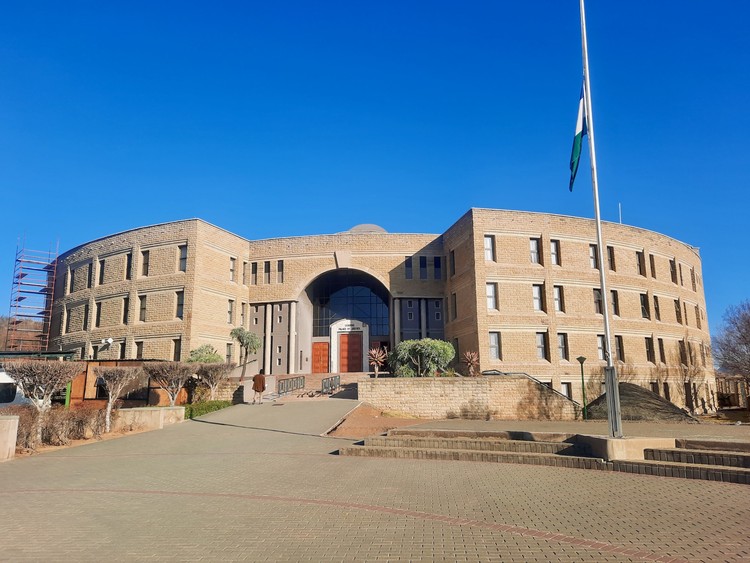
14 July 2025
Lesotho Palace of Justice in Maseru. The Lesotho Highlands Development Authority wants a case against it dismissed. Photo: Sechaba Mokhethi
On Thursday, the Lesotho Highlands Development Authority (LHDA) filed papers with the High Court to oppose a case brought on behalf of thousands of people and hundreds of businesses, claiming decades of unpaid or inadequate compensation. This follows the disruption and displacement of communities caused by the Lesotho Highlands Water Project (LHWP).
The LHDA says the case should be summarily dismissed, calling it “misguided” and “legally baseless”.
The lawsuit, filed by people from Mokhotlong, Thaba Tseka and those relocated to Maseru, say their communities were displaced by the construction of the Katse, Mohale and Polihali dams, and they were never properly compensated. They also seek a percentage of payments made to contractors in the project.
In an answering affidavit, LHDA chief executive officer Tente Tente says the applicants’ claims are riddled with legal and factual flaws. He says compensation mechanisms already exist and have been implemented under Lesotho’s laws and the LHDA’s compensation policies, dating back decades. Tente says the applicants are attempting to mount an “irregular constitutional petition”, which does not actually challenge any laws or policies in place for compensation.
LHDA says the principal applicant (the Mokhotlong Business Forum Development Trust) and second applicant (Community Resources Development Trust) are new entities that lack the legal status to initiate a lawsuit against a project that was launched nearly 40 years ago.
Tente says the groups have no standing and have failed to demonstrate either any direct causal link or their interest in the case. They have not even presented evidence that they owned or inhabited the affected land.
He also questioned the failure of the applicants to include the government of South Africa as a party to the proceedings, and whether the court has jurisdiction over a bilateral treaty born out of two states.
Regarding the applicants’ demand for a share of “contract price percentages” from LHDA’s contractors, Tente says this is outside the applicants’ rights, as these contracts are private agreements between the LHDA and third-party contractors, not to be confused with “their purported rights to compensation”.
As to allegations of unlawful arrest, torture, and prosecution, Tente says these are criminal matters, and cannot be bundled into a constitutional case about compensation and infrastructure development.
On the issue of compensation, LHDA says it has been meeting its obligations through policies such as the LHWP Compensation Policy of 1997 and its updated frameworks. It cites individual and communal payments made to residents affected by the project.
Tente also says some individual applicants had failed to disclose to the court that “they have been routinely compensated” and “paid their dues”.
He says there are alternative existing remedies – “a simple claim for compensation aligned to the regulatory laws and policies”.
According to the LHDA, it has made disbursements to community cooperatives in the form of annuities and lump sums. Development priorities are being identified through regular consultations. For instance, Tente applauded the Thaba-Thabana Mahlanya Association in Thaba Tseka district, which is completing a communal shopping complex.
The LHDA says cooperatives were unable to account for the funds they received. Tente blames delays or failures in some areas on poor local capacity and limited management skills within the community cooperatives, a challenge the LHDA is tackling together with the Commissioner for Cooperative Development.
Tente says cooperatives were affected by corruption with committee members siphoning off funds meant for communal benefit. As a result, he admits that some projects for communities could not be sustained.
The court will now deliberate on the opposing claims: the applicants who claim they have been left far worse off by one of southern Africa’s biggest infrastructure projects, and the LHDA which maintains the case is bogus and fundamentally flawed, and should be summarily dismissed.
Attorney Monaheng Rasekoai, who represents the LHDA in this matter, also serves as the board chairperson of the MNN Centre for Investigative Journalism in Maseru. The author of this article is the centre’s managing director.